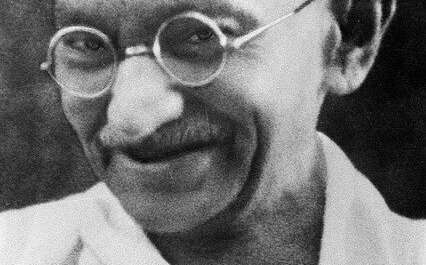
Gandhi – A Proponent of Well-Rounded Education for All
Read a summary using the INOMICS AI tool
Today marks the 145th anniversary of the birth of Mohandas Karamchand Gandhi, born October 2, 1869 in Porbandar, India. More commonly referred to by the honorific title Mahatma (Sanskrit for “high-souled”), Gandhi is well known for his leading role in the Indian independence movement against British rule in the early to mid-20th century. Gandhi employed nonviolent civil disobedience, promoting religious tolerance and a strongly humanitarian worldview.
Yet, what many people might not be aware of is that Gandhi was also a strong proponent of comprehensive education reform, calling for more educational opportunities for everyone. He believed that the only way to fully change Indian society was to start from the bottom up, promoting the integration of hands-on learning alongside skills such as literacy and logic. Gandhi wanted the Indian school system to be self supporting and fully separate from that in England, allowing it to grow in a way that made sense in that specific region. He believed that manual and mental work must complement one another, and that education must nourish the whole person. To describe this view he was quoted as saying:
By education I mean an all-round drawing out of the best in the child and man—body, mind and spirit.
At the time this view was quite radical, as it tore through the strict structure of the caste system in India. By promoting the production of handicrafts as a part of comprehensive education, Gandhi was arguing against the class-based specialization of labor that was becoming the global norm. If we look at the reality many people face today, however, we can see that Gandhi’s teachings in this area are still highly relevant. While a formal education is incredibly valuable, it is also important to have a diversity of skills in order to be a well-rounded and successful individual. Furthermore, Gandhi was also quoted stating:
Persistent questioning and healthy inquisitiveness are the first requisite for acquiring learning of any kind.
This quote underscores Gandhi’s promotion of interactive education and intrinsic interest in a given subject. Such interest is precisely what is required in order to stay motivated at a high level, for instance while pursuing graduate or postdoctoral research. In this realm, the rise of interdisciplinary and international education fits into Gandhi’s ideas of broad-scale learning. Moreover, the proliferation of Massive Open Online Courses(MOOCs) and free online education are also key examples of a contemporary global movement away from classically structured formal education.
Thus, while we remember Gandhi today, we should not only think of his achievements in the realms of peace, independence and religious tolerance, but also in the area of open, diverse and well-rounded education.
Photo credit: David Nash
-
- Postdoc Job
- Posted 1 week ago
Postdoctoral Research Fellow - New Zealand Policy Research Institute
At Auckland University of Technology (AUT University) in Auckland, Nueva Zelanda
-
- Postdoc Job
- (Remote)
- Posted 1 month ago
Vacancy for a Postdoctoral fellow
At University of Ghent in Gent, Bélgica
-
- Assistant Professor / Lecturer Job
- Posted 1 week ago
Lecturer/Senior Lecturer - Economics
At University of Otago in Dunedin, Nueva Zelanda














